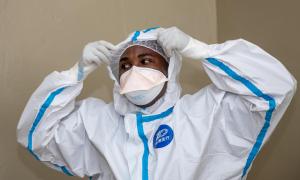On the frontlines of Congo’s COVID-19 battle
Brazzaville – When Dr Regis Ondze arrives at work each morning at the Albert Leyono Municipal Clinic, a low-slung beige building with ornate white balustrades near the banks of the Congo River, he finds himself on the frontlines of his country’s fight against COVID-19.
After the first case of the virus was announced in Republic of the Congo on 14 March this year, the Albert Leyono Clinic was selected by the Congolese government as one of the main hospital facilities to care for critically ill COVID-19 patients. Dr Ondze has since seen 17 patients test positive for COVID-19 at the facility, as the country’s total case count has risen to 741 cases with 25 deaths as of 10 June 2020. But neither the personal risks nor the growing weight of responsibility have deterred him. “My duty is to care for and protect others,” he says matter-of-factly.
As the clinic’s team of 17 doctors, 53 nurses and a number of ward assistants has set about taking on its crucial role, it has benefited from extensive training by the World Health Organization (WHO) on clinical care, treatment and infection prevention and control. Like other health workers across the country and the wider region, the team at Albert Leyono has also received essential personal protective equipment including thousands of medical gloves, goggles and masks through the United Nations Solidarity Flight, which touched down in Brazzaville on 18 April.
"For us, the first priority is to ensure that our health care staff are not exposed to possible contamination from COVID-19,” says Dr Abel Owoma, the clinic’s director. “Without them, we will lose this battle.” Thirteen health workers have been infected with the virus in Congo so far, and two have died.
"Doctors, nurses and other frontline health workers must be appropriately equipped to ensure optimal patient care, but also and especially, to ensure their own safety in the performance of their respective duties," adds WHO Representative in Congo, Dr Lucien Manga.
Carrying out those duties can come with considerable personal sacrifice. For Carine Guenkou, a nurse who has been working at the Albert Leyono Clinic for five years, they have meant moving away from home and living in isolation to protect her family from infection. “It’s always hard to be away from them,” she says, “but I hope that our efforts will help to end this pandemic soon and we are encouraged by the victories we are already achieving.”
In particular, Ms Guenkou draws inspiration from a recent case of a 37-year-old woman whose mother died after three weeks at the clinic but who, after then testing positive herself and showing severe symptoms for around a week, achieved a full recovery under Ms Guenkou’s and her colleagues’ care and returned home. “When the mother died and her daughter tested positive straight after, it was very difficult for us to bear,” Ms Guenkou recalls. “But the day that she walked out of here, it reminded me that we can defeat this virus.”
Dr Ondze concedes that there are, however, a number of persisting challenges at the clinic. Some equipment is not currently functional, while the construction of a much-needed resuscitation unit remains unfinished, which complicates the care of the most severe cases, and the clinic is also short of supplies for the use of oxygen for patients.
These kinds of critical gaps are frequently mirrored across the country and much of the wider region, which places an increased burden on doctors and nurses on the frontlines. But WHO continues to work with African governments to keep training health workers and improving surveillance, testing, contact tracing and treatment. More than 12 500 health workers have been trained in WHO African Region since the beginning of the pandemic. WHO is also providing technical expertise in countries, either remotely or by embedding experts in national response teams.
“The whole team benefitted from the training with WHO experts,” Dr Ondze reiterates as he prepares for the day’s work ahead, donning and then meticulously checking his personal protective equipment in a small changing room inside the clinic. There are seven positive cases and two suspected cases that will require his attention over the course of the day. It’s been a trying few months for the whole team, and Dr Ondze says there have been fleeting moments when he questioned his decision to become a doctor in the first place. “But any kind of work can be difficult,” he adds defiantly. “I took an oath and I will stand by it.”
Communication and Health Promotion
Email : biboussib [at] who.int (biboussib[at]who[dot]int)
Communications Officer
WHO Regional Office for Africa
Email: dialloka [at] who.int (dialloka[at]who[dot]int)
Communications and marketing officer
Tel: + 242 06 520 65 65 (WhatsApp)
Email: boakyeagyemangc [at] who.int (boakyeagyemangc[at]who[dot]int)
WHO Regional Office for Africa
Acting Regional Communications Manager
Email: ottob [at] who.int (ottob[at]who[dot]int)



